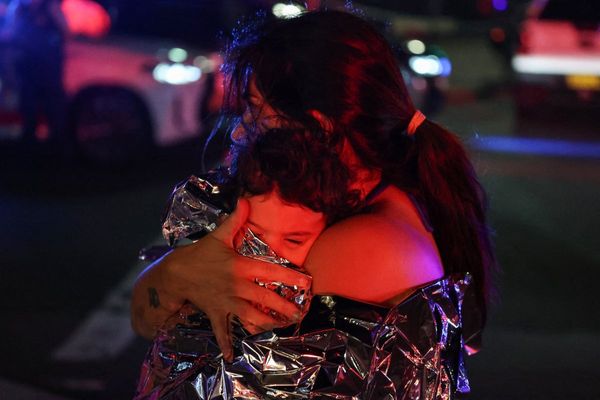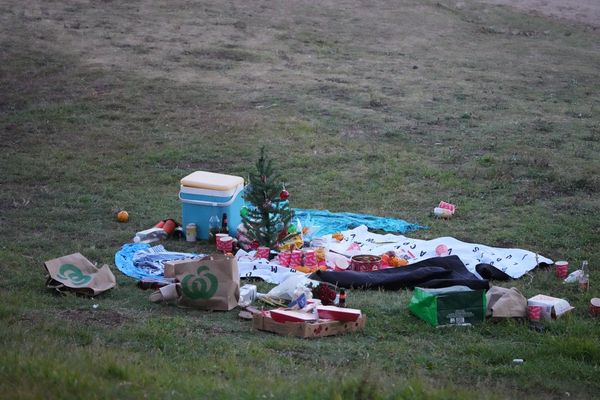
It was shortly after the final whistle had blown on England’s semi-final victory over the Netherlands that the barrage began. First one plastic cup landed in the press box, beer exploding from it in a sticky fountain, then another and another until all you could hear other than the insistent PA was the crump of plastic on desk and the shouts of journalists taking hits and trying to protect their laptops.
Looking up towards the tier from which they came, there was a terrible beauty to it, the cups with their furls of lager illuminated in the floodlit sky, falling slowly with an implausible grace before their liquid detonation.
Nobody in the real world cares about the gripes of journalists – and rightly so. Our working conditions, the mechanics of getting accredited, the perfunctory yet demeaning security checks, even the pointless and largely unworkable new seat selection tool (not available on mobile) are of interest to nobody but journalists –although it would be nice if at some point Uefa gave a moment of practical consideration. But the scenes on Wednesday were symptomatic of much greater issues.
At every game in Dortmund at this tournament, sometimes in celebration, sometimes in fury, beer has been flung from the upper tier down on to the seats below. This is, obviously, dangerous. Being hit by a hard plastic glass full of beer that has fallen 30 or 40 feet hurts.
People in those seats may come from a religious or cultural background in which alcohol is forbidden; are they somehow not welcome at a Uefa event? Are they supposed to just accept the discomfort? Beer, anyway, is annoying: it’s wet and it stinks. Expensive electronic equipment, such as laptops, tends not to react well to being soaked in beer.
And yet Uefa did nothing. It left thousands of people, hundreds of them trying to work, as sitting ducks in a boozy shooting gallery. There was no attempt to erect a cover, no redeployment of stewards, no restriction on alcohol sales. There was clear callousness towards an obvious safety hazard.
This is how the modern Uefa functions: it shrugs and hopes the problem, whether it’s beer bombs or sportswashing, fixture congestion or multiple ownership, goes away. It has not been helped over the past month, it’s true, by the rail network Deutsche Bahn and its one-company mission to obliterate cliches about German efficiency, but again and again at this tournament there have been scenes of fans in their tens of thousands milling for hours after games having no idea how they were going to get back to their accommodation.
It is true that, at an international tournament, fans are less likely to know the ground and its environs and so will need greater guidance, and that many will be travelling away from the city afterwards, but it’s also true that German stadiums host crowds of 60,000 and more every week and have very few problems with dispersal.
That makes this a Uefa problem. No thought seems to have been given to the infrastructure around games or whether, say, Gelsenkirchen is really an appropriate venue for a 9pm kick-off given the city’s dearth of hotels.
Once or twice might be misfortune but post-game transport chaos was a regular occurrence that reached its climax in Dortmund on Wednesday. That fans have remained relatively good-humoured, that serious disorder has not erupted, is a minor miracle; even more incredible is that people remain eager to pay several hundred pounds for an experience that is almost certain to involve several hours of queueing in an enclosed space, quite possibly with a compulsory march, often in torrential rain.
There has been a marked downturn in organisation since the Covid lockdown. Chaos has been a recurring theme at recent major finals. There was the charge and fighting on the concourse at Wembley at the Euro 2020 final. There was the shambolic organisation in Seville at the Europa League final in 2022 that left hundreds wandering around the stands with neither signs nor stewards to help them find their seats. There was the transport breakdown in Istanbul at the 2023 Champions League final that left fans in wheelchairs being dragged over rutted mud, while others queued for more than an hour in the heat for $12 bottles of water.
And worst of all there was the 2022 Champions League final in Paris, where fans were corralled into a dangerously packed tunnel, automatic ticket readers didn’t work and the consistently disgraceful French police ran amok.
It’s true that in each case there were local factors, but it is Uefa’s job to resolve that. This tournament has been little better. As in Paris and Seville, basic signage has been extremely limited. Volunteers have generally been cheery and as helpful as they can be, but often have not been briefed with basic information. Stewarding has been essentially useless and proved incapable of stopping selfie-hunters invading the pitch.
When a thunderstorm broke in Dortmund about 70 minutes before kick-off on Wednesday there was a minor surge towards the portable buildings where media go through metal detectors and have their bags checked. It was only about a dozen fans trying to escape the rain and far from violent, but it was enough to overwhelm security; had it been part of a coordinated attempt to access the stadium, as happened at Wembley and in Paris, it was clear they would have made it through. No lessons, seemingly, have been learned; complacency reigns.
These are the basics of getting people into and out of grounds safely. If they can’t get those right, what hope for the more complicated questions of player fatigue, tournament structure, the global calendar and ownership? Greed will continue to win because Aleksander Ceferin’s Uefa is not equipped to act for the good of the game. It can’t even grow grass properly.
Insiders say the organisation has been hit by an exodus of experience and talent because morale is so low. That could have devastating consequences for how football looks in the future. But far more pressing are issues of basic safety. Specific concerns have been raised and ignored. The attitude seems to be just to hope for the best. They’ve got away with it so far, but that might not always be the case.







